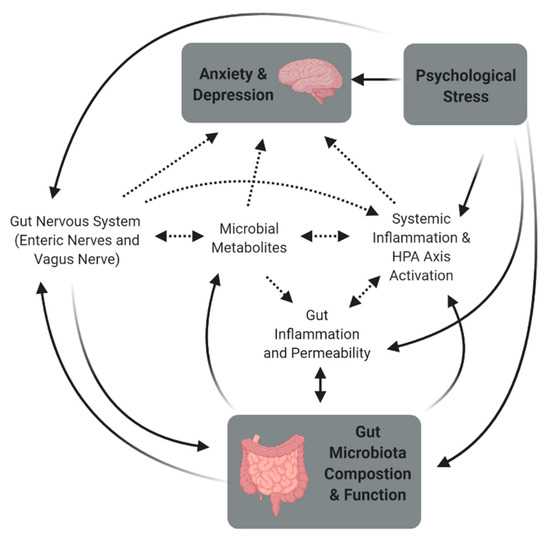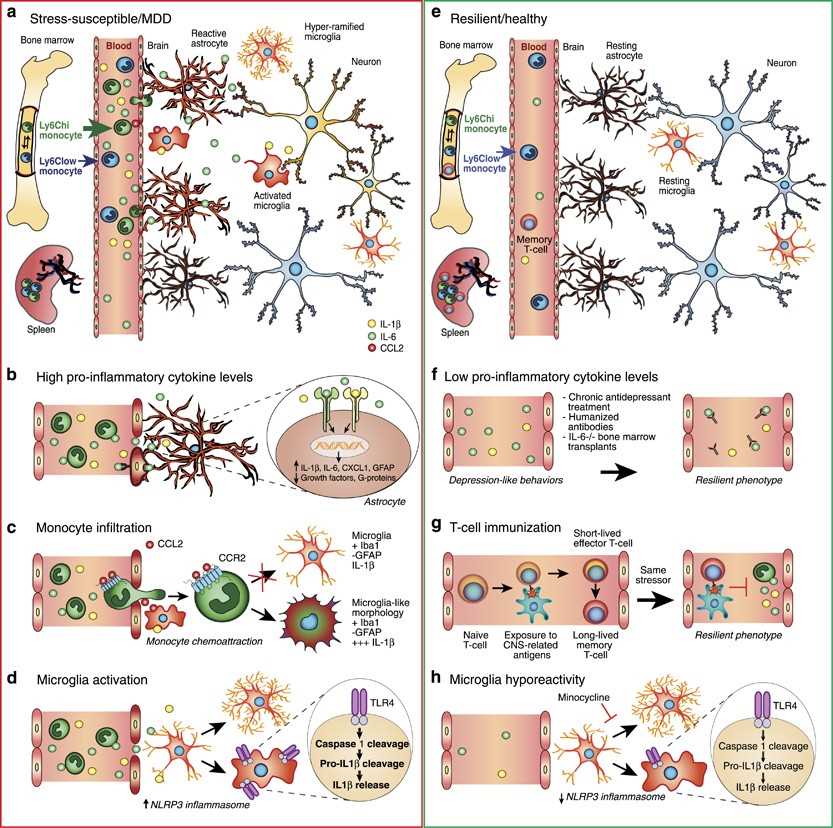
Depression is a complex mental health disorder that affects millions of people worldwide. It is characterized by persistent feelings of sadness, hopelessness, and a loss of interest in daily activities. While the exact causes of depression are still not fully understood, researchers have identified a number of factors that contribute to its development, including genetic, biological, and environmental influences.
One important aspect of depression that researchers have been studying is the role of stress. It is well-known that stress can trigger or exacerbate depressive symptoms, but recent studies have shown that not all individuals respond to stress in the same way. Some individuals are more vulnerable to the effects of stress and are more likely to develop depression, while others are more resilient and are able to cope with stress more effectively.
This phenomenon is known as stress sensitization and stress resilience. Stress sensitization refers to the process by which repeated exposure to stressors increases an individual’s vulnerability to developing depression. On the other hand, stress resilience refers to an individual’s ability to adapt and cope with stress, thereby reducing their risk of developing depression.
Exploring Stress Sensitization in Depression

In the field of mental health, stress is known to play a significant role in the development and exacerbation of depressive symptoms. However, not all individuals respond to stress in the same way, with some showing greater resilience and others exhibiting increased sensitivity.
Stress sensitization refers to the process by which an individual becomes more susceptible to the negative effects of stress over time. This can lead to a heightened reactivity to stressors, resulting in an increased risk for developing depression. Understanding the mechanisms underlying stress sensitization is crucial for improving our ability to predict and prevent the onset of depressive episodes.
Research has shown that individuals with a history of early-life stress or trauma are more likely to experience stress sensitization. Adverse childhood experiences, such as abuse or neglect, can alter the brain’s response to stress and increase vulnerability to depressive symptoms later in life. Additionally, genetic factors and certain personality traits, such as neuroticism, may also contribute to an individual’s susceptibility to stress sensitization.
It is important to note that not all individuals who experience stress sensitization will go on to develop depression. Some individuals may exhibit resilience, which refers to the ability to adapt and cope effectively with stress. Resilience can be influenced by various factors, including social support, positive coping strategies, and the presence of protective factors.
Further research is needed to better understand the complex interplay between stress, sensitization, and resilience in the development of depression. By identifying the specific mechanisms involved, researchers can develop targeted interventions and treatments to help individuals at risk for stress sensitization and improve their resilience to stress.
The Role of Stress in Depression

Stress plays a significant role in the development and exacerbation of depression. Individuals who experience high levels of stress are more susceptible to developing depression, and those who are already depressed may have increased sensitivity to stressors. This phenomenon, known as stress sensitization, can lead to a vicious cycle in which stressors trigger depressive episodes, which in turn further increase stress levels.
Resilience to stress, on the other hand, can protect against the development of depression. Some individuals are naturally more resilient to stress, meaning they are better able to cope with and recover from stressful situations. This resilience may be influenced by a variety of factors, including genetic predisposition, early-life experiences, and social support.
Chronic or repeated exposure to stress can have long-lasting effects on the brain and body, contributing to the development and persistence of depressive symptoms. Stress can disrupt the functioning of key brain regions involved in mood regulation, such as the prefrontal cortex and the hippocampus. It can also dysregulate the stress response system, leading to increased production of stress hormones like cortisol.
Understanding the role of stress in depression is crucial for developing effective treatments and interventions. By targeting stress management and resilience-building strategies, clinicians and researchers can help individuals with depression better cope with stressors and reduce the risk of relapse. Additionally, identifying individuals who are at high risk for stress-related depression can allow for early intervention and prevention efforts.
In conclusion, stress plays a complex and significant role in depression. It can both sensitize individuals to future stressors and exacerbate existing depressive symptoms. However, resilience to stress can protect against the development of depression. Further research is needed to better understand the mechanisms underlying stress sensitization and resilience, with the ultimate goal of improving outcomes for individuals with depression.
Understanding Stress Sensitization

Stress sensitization refers to the process by which an individual becomes increasingly vulnerable to the negative effects of stress over time. In the context of depression, stress sensitization plays a crucial role in the development and recurrence of depressive episodes.
When someone experiences stress, it triggers a cascade of physiological and psychological responses in the body. These responses are meant to help the individual cope with the stressor and return to a state of equilibrium. However, repeated or chronic exposure to stress can disrupt this delicate balance and lead to sensitization.
In individuals who are prone to depression, stress sensitization can result in a heightened response to stress. This means that even minor stressors can trigger a disproportionately strong reaction, leading to the onset of depressive symptoms. Over time, the threshold for stress needed to trigger a depressive episode becomes lower, making the individual more susceptible to future episodes.
There are several factors that contribute to stress sensitization in depression. Genetic predisposition, early life adversity, and previous episodes of depression can all increase an individual’s vulnerability to stress. Additionally, the presence of other psychiatric disorders, such as anxiety or substance abuse, can further amplify the effects of stress.
Understanding stress sensitization is crucial for developing effective interventions for individuals with depression. By identifying and addressing the underlying factors that contribute to stress sensitization, healthcare professionals can help individuals build resilience and reduce their risk of future depressive episodes.
Factors Contributing to Stress Sensitization

Resilience and stress are two interconnected factors that play a significant role in the development and progression of depression. While resilience acts as a protective factor against the negative effects of stress, stress sensitization contributes to an individual’s vulnerability to stress and subsequent development of depression.
In the context of stress sensitization, various factors can contribute to an individual’s increased susceptibility to stress. These factors can be categorized into biological, psychological, and environmental factors.
Biological Factors: Certain biological factors, such as genetic predisposition and alterations in brain chemistry, can contribute to stress sensitization. Genetic variations in stress-related genes can make an individual more susceptible to the negative effects of stress. Additionally, imbalances in neurotransmitters like serotonin and dopamine can impair an individual’s ability to cope with stress, leading to sensitization.
Psychological Factors: Psychological factors, including negative cognitive biases and maladaptive coping strategies, can also contribute to stress sensitization. Individuals with a tendency to perceive stressors as overwhelming or uncontrollable may be more likely to experience sensitization. Furthermore, maladaptive coping mechanisms, such as avoidance or rumination, can exacerbate the impact of stress on mental health.
Environmental Factors: The environment in which an individual lives can also contribute to stress sensitization. Adverse childhood experiences, such as trauma or neglect, can shape an individual’s stress response system, making them more reactive to stress later in life. Additionally, chronic exposure to stressful life events, such as financial difficulties or interpersonal conflicts, can further sensitize an individual to stress.
Understanding the factors contributing to stress sensitization is crucial in developing effective interventions for individuals with depression. By addressing these factors and promoting resilience, it may be possible to mitigate the negative impact of stress and prevent the development of depression.
Examining Stress Resilience in Depression

Resilience is a crucial factor in understanding and addressing depression. While stress sensitization is a well-known concept in depression research, the study of stress resilience is equally important. Resilience refers to an individual’s ability to adapt and bounce back from adversity, including stressful life events.
In the context of depression, examining stress resilience can provide valuable insights into why some individuals are more susceptible to developing depression in response to stress, while others are able to maintain their mental well-being. Understanding the mechanisms that underlie stress resilience can help identify potential targets for interventions and prevention strategies.
Research suggests that stress resilience is a multifaceted construct that involves various psychological, neurobiological, and social factors. Psychological factors, such as cognitive flexibility and positive emotion regulation strategies, play a significant role in promoting resilience. Neurobiological factors, including the hypothalamic-pituitary-adrenal (HPA) axis and the amygdala, are also implicated in stress resilience.
Furthermore, social support and connectedness have been shown to enhance resilience and buffer the negative effects of stress. Strong social networks and supportive relationships can provide individuals with the necessary resources and emotional support to cope with stress effectively.
Examining stress resilience in depression can help shed light on the factors that contribute to an individual’s ability to withstand and recover from stressors. By understanding the mechanisms of resilience, researchers and clinicians can develop targeted interventions to enhance resilience and prevent or mitigate the negative impact of stress on mental health.
In conclusion, resilience is a vital aspect of depression research, alongside stress sensitization. Examining stress resilience in depression can provide valuable insights into the factors that promote mental well-being and protect against the development of depression in the face of stress. By understanding and promoting resilience, we can work towards more effective strategies for preventing and treating depression.

I am Patrina de Silva, a psychologist and mental health blogger in Sri Lanka. After obtaining psychology degrees from the University of Colombo and Monash University, I returned home to work as a counselor while also starting the popular blog “Pressy but Happy” to provide advice on psychological issues. Over the past decade, my empathetic articles have made my blog a leading mental health resource in the country. In addition to writing, I maintain a private therapy practice, frequently volunteer counseling time, and conduct seminars, driven by my passion for destigmatizing mental illness and educating the public on the mind-body connection. I strive to be an influential voice in my field through my compassionate approach.
